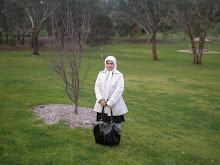Following text is part of Jimenez's speech for college students in 2003. I found it very interesting. I hope it changes -even a bit- our way of thinking. This is the first part of his speech. I will post other sections in next posts.
What's better than .....By Butch JimenezAs college students, you're just about to set sail into the real world.As you prepare for the battle ground of life, you'll hear many speeches,read tons of books and get miles of advise telling you to
work hard,
dream big, go out and do something for yourself, and
have a vision.
Not bad advise, really. In fact, following these nuggets of truth may just bring you to the top. But as I've lived my life over the years, I have come to realise that it is great to dream big, have a vision, make a name, and work hard. But guess what : There's something better than that -
So my message today simply asks the question,what's better than ...?
What's better than being negative ?Let's start off with something really simple.What's better than a long speech ? No doubt, a short one. So, you guysare in luck because I intend to keep this short.
Now, let me take you through a very simple math exam. I'll rattle off a couple of equations, and you tell me what you observe about them. Be mindful of the instruction. You are to tell me what you observe about the equations.
Here it goes : 3+4=7, 9+2=11, 8+4=13 and 6+6=12.Tell me, what do you observe ?
Every time I conduct the test, more than 90 percent of the participants immediately say, 8+4 is NOT 13, it's 12. That's true and they are correct. But they could have also observed that the three other equations were right. That 3+4 is 7, that 9+2 is 11, andthat 6+6 is 12.
What's my point ?
Many people immediately focus on the negative instead of the positive. Most of us focus on what's wrong with other people more than what's right about them. Examine those four equations. Three were right an only one was wrong. But what is the knee-jerk observation ?The wrong equation.
If 10 people you didn't know were to walk through that door, most of you would describe those people by what's negative about them. He's fat.He's balding. Oh, the short one. Oh, the skinny girl. etc.
Get the point ? It's always the negative we focus on and not the positive.You'll definitely experience this in the Corporate World. You do a hundred good things and one mistake-guess what? Chances are, your attention will be called on that one mistake..
So what's better than focusing on the negative ?
Believe me, it focusing on the positive. And if this world could learn to
focus on the positive more than the negative, it would be a much nicer place to live in.

